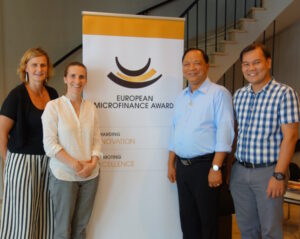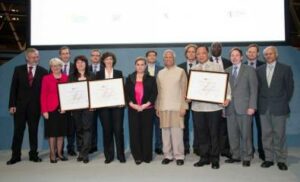 Earlier this summer, InFiNe.lu had the pleasure to briefly meet 2 representatives of ASKI (from The Philippines), while visiting the House of Microfinance. Enough to get updates on how did ASKI spend the Award and on what are their new projects and challenges.
Earlier this summer, InFiNe.lu had the pleasure to briefly meet 2 representatives of ASKI (from The Philippines), while visiting the House of Microfinance. Enough to get updates on how did ASKI spend the Award and on what are their new projects and challenges.
ASKI, the Alalay Sa Kaunlaran Inc (translated as support to progress), is the winner of the 2012 European Microfinance Award on “Microfinance to Improve Food Production and Distribution Conditions”.
See the video of ASKI’s initiative that won the European Microfinance Award in 2012.
ASKI is a non-government organisation based in Cabanatuan City, Nueva Ecija. It is located 115 kilometers north of Manila, the capital of the Philippines. It was registered on March 23, 1987 at the Securities and Exchange Commission (SEC) primarily to provide microfinancing to those in the bottom of the socio-economic hierarchy. During those years, poverty and unemployment were widespread because of the transition of leadership brought about by political conflicts.
For the past 31 years, ASKI was able to form its Group of Companies now known as the ASKI Group of Companies Inc. It is the mutually reinforcing institutions of the organisation. These strategic units were established as part of our innovations to address the socio-economic problems in the regions of our operation. To date, ASKI has 12 different companies serving the needs of our clients and the community as a whole.
During the press conference with Mr. Rolando B. Victoria, former Executive Director of ASKI and now the President and CEO of ASKI Group of Companies, Inc. and other finalists at the Neumünster Abbey he mentioned that should ASKI win the Award, the organisation will return this to the community by providing the needed technologies, infrastructure and equipment of the community.
He said during the press conference, “Today, almost 19,000 farmers are benefiting from our agricultural loan program, which are making a valuable contribution to the needed food security initiatives in our country.
In his messa ge during the awarding ceremony and announcement of ASKI as winner, “We are honored to receive this recognition and this will serve as our inspiration to continue our efforts and develop more products for our clients. We will use the funds to invest in further opportunities for the farming community which would provide them with additional sources of income to sustain the daily needs of their family,” Mr. Victoria said.
ge during the awarding ceremony and announcement of ASKI as winner, “We are honored to receive this recognition and this will serve as our inspiration to continue our efforts and develop more products for our clients. We will use the funds to invest in further opportunities for the farming community which would provide them with additional sources of income to sustain the daily needs of their family,” Mr. Victoria said.
For its food security initiatives, ASKI started the value chain financing for agriculture. Farmers were linked to manufacturers like San Miguel Corporation and Jollibee Foods Corporation for their produce. This is the reason why, farmers are assured of higher income.
Farmers were also given irrigation facilities like movable water pumps in non-irrigated areas of Aurora, construction of hanging bridges for easy transport of the farm produce, multi-purpose drying pavements to dry their harvests. With this project, farmers will no longer use the roads in drying their palay (=rice at any stage prior to husking —used especially in the Philippines. Source: https://www.merriam-webster.com/dictionary/palay). This traditional highway drying contributes to significant postharvest losses and affects the quality of the produce.
Multi-purpose drying pavements
Threshing machines and hand tractor
Infrastructure support is not only the priority of ASKI. Farmers also need to be attuned on the recent developments in the agriculture sector. Resource persons from both the government and the private sector were tapped to train clients on different agricultural techniques that can help them in their farming activities.
With the prize money from the 2012 European Microfinance Award, more than 7,000 individuals benefitted from the projects given and conducted in various communities where ASKI operates.
With the winning prize of ASKI, the organisation was able to provide employment among the Community Development Officers working under the ASKI Foundation Inc which enabled them to support the needs of their respective families. This gave them also the opportunity to strengthen their networking skills, community organising and learn new experiences as ComDev officers. Ultimately, they feel the satisfaction of being of service to the community and imbibe the vision, mission and core values of ASKI.
On the other hand, ASKI’s initiative gained popularity not only in the local front but in the international community as well. In different conferences and symposia, ASKI was asked to present the best practices in this initiative. With this momentum, we were able to get the strong commitment from our stakeholders, provided capacity building activities, strong support from our partners and ultimately, helped the communities especially our farmer-clients increase their incomes.
LIVELIHOOD FOR THE EXTREME POOR (LIFE) PROGRAM
In 2017, we kicked-off the implementation of the LIFE (Livelihood for Extreme Poor) Program in partnership with the Australian Government and Opportunity International-Australia. The project is aimed at assisting the ultra-poor in achieving social, economic and aspirational changes in their lives to come out of extreme poverty. We have supported 1,000 families in the first and second treatment of the project.
WATER, SANITATION AND HYGIENE (WASH) PROGRAM
ASKI is now on the second phase of the partnership with Water.Org to implement the Water, Sanitation and Hygiene (WASH) loan program in the areas of our operation. To date, we were able to cater the WASH needs of 9,406 clients amounting to Php140 million or around EUR 2.2 million reaching 45,443 individuals.
MEN AT WORK PROGRAM
ASKI partnered with Wholistic Transformation Resource Center (WTRC) to carry out the Men at Work Program entitled “Empowering Urban Men through Integrated Development Approach”.
The program is aimed at training the low-income men and capacitating their social, economic, and spiritual abilities through participative and transformational dimensions. The program is centered in organising sixty (60) poor urban families within the selected communities of Cabanatuan City in Nueva Ecija. The program utilises an integrated development approach which involves community organisation, skills development, spiritual enhancement and community-based projects.
RENEWABLE ENERGY PROGRAM
ASKI is also participated in the Energy Inclusion Initiative of ADA in Luxembourg and now strengthening its Renewable Energy Program through the Green Energy Loan (GEL). In 2017, ASKI through the ASKI Multipurpose Cooperative in partnership with ASKI Microfinance provides loan to client needing solar lamps, solar electric fan, to solar irrigation and solar street lights. Today, ASKI already served 1,162 clients with loans amounting to Php 7.7 million or EUR 122,000.
PILOTING OF MOBILE TECHNOLOGIES ON LOAN RELEASES AND BILLS PAYMENT
In our efforts to provide convenience to our clients and support the paperless and mobile money transactions, ASKI partnered with RuralNet Inc. and It’s Like Cash for Asia and the Pacific.
The partnership with RuralNet Inc. offers ASKI to be a payment centers for government and private sector providers like Social Security, Philippine Health Insurance, Housing Contributions as well as bills payment. The technology will also be utilised for loan releases and loan payment making it more convenient to customers especially those in the rural communities. Moving forward, it is hope that it will become a one-stop hub for a wide range of financial services.
Meanwhile, It’s Like Cash is a kind mobile money platform geared towards making money transactions more efficient and cheaper for clients and ASKI. It also helps enhance the financial inclusion activities of the organisations especially in the rural areas as it leads to lower business cost and increased consumer spending, both drivers of economic growth.
CHALLENGES
(Source: ASKI)
InFiNe is the Luxembourg platform that brings together public, private and civil society actors involved in inclusive finance. The value of InFiNe lies in the wide range of expertise characterised by the diversity of its members.
With the support of

Inclusive Finance Network Luxembourg
39, rue Glesener
L-1631 Luxembourg
G.-D. de Luxembourg
Tel: +352 28 37 15 09
contact@infine.lu
R.C.S. : F 9956
Legal notice
Privacy notice
Picture 1 © Pallab Seth
